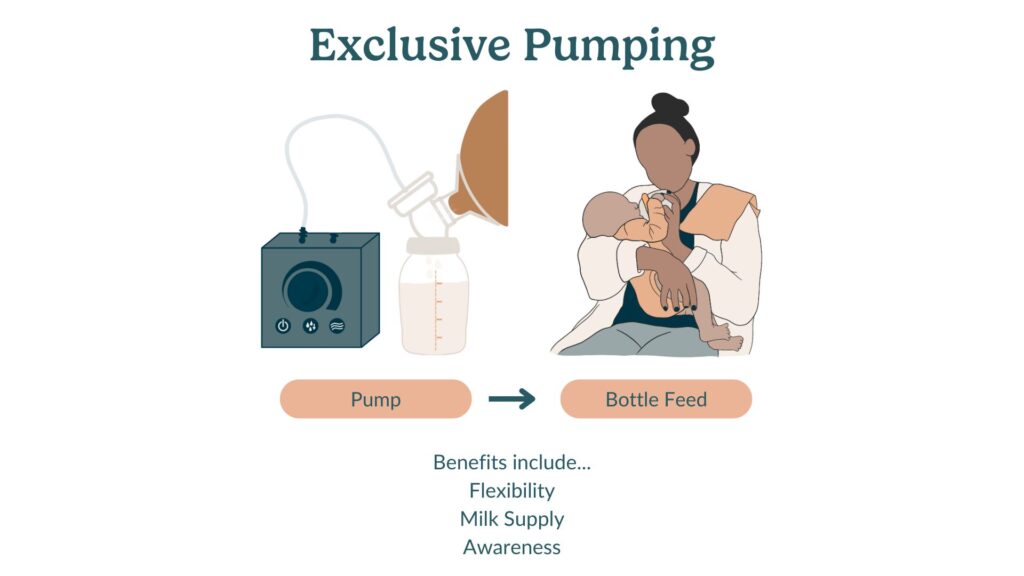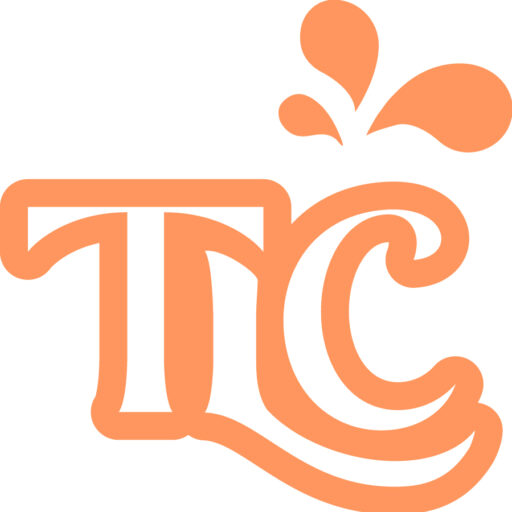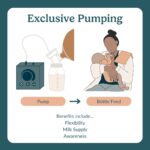exclusive pumping

Exclusive pumping
Exclusive pumping, also known as EPing, involves using a breast pump to extract milk from your breasts for every feeding instead of breastfeeding directly. This method can be beneficial for various reasons, such as when the baby has difficulty latching, if the mama needs to be away from the baby, or personal preference.
What to watch out for
It’s important to understand the principles of exclusive pumping and how to manage it effectively. Here are some considerations and tips:
Benefits
- Flexibility: Allows others to feed your baby with a bottle, providing flexibility and sharing feeding responsibilities.
- Milk supply: Ensures your baby receives the nutritional and immunological benefits of breastmilk even if direct breastfeeding is not possible.
- Awareness: Help you observe your baby's milk intake and helps you monitor your milk production.
Potential Challenges
- Time-consuming: Pumping regularly and maintaining a schedule can be time-consuming and demanding.
- Equipment: Requires investment in a good-quality breast pump and proper storage containers for expressed milk.
- Emotional aspects: Some mamas may miss the bonding experience of direct breastfeeding.
Tips for Managing Exclusive Pumping
- Establish a pumping schedule: Pump at regular intervals, ideally every 2-3 hours during the day and every 4-5 hours at night, to mimic a baby’s feeding pattern and maintain your milk supply. Read more about how often to pump
- Use a double electric pump: A double electric breast pump is efficient and can save time by expressing milk from both breasts simultaneously.
- Stay hydrated and nourished: Drink plenty of water and maintain a balanced diet to support milk production.
- Store milk safely: Follow guidelines for storing expressed milk, keeping it in clean, sterile containers, and labeling it with the date and time. Learn more about milk storage guidelines
- Practice self-care: Take care of your physical and emotional well-being. Pumping can be demanding, so ensure you get enough rest and support.
Physical limitations or health circumstances
Certain conditions can influence the need for exclusive pumping:
- Latching difficulties: If your baby has difficulty latching due to conditions like tongue tie or other oral issues, exclusive pumping can ensure they still receive breastmilk.
- Premature birth: Preemies may not be able to breastfeed effectively right away, so pumping can provide them with breastmilk until they are ready.
- Maternal health: Conditions or treatments that prevent direct breastfeeding may necessitate exclusive pumping.
Other terms
Understanding related terms can help you better manage exclusive pumping and related practices:
- Let-down reflex: The release of milk from the breast triggered by pumping or the baby’s sucking. Learn more about let-down
- Engorgement: Swelling and discomfort of the breasts due to milk accumulation, which can be relieved by regular pumping. Read more about managing engorgement
- Milk storage guidelines: Recommendations for safely storing expressed breastmilk in the refrigerator or freezer. Breastmilk storage guidelines
- Double electric pump: A breast pump that expresses milk from both breasts simultaneously, increasing efficiency.
- Lactation consultant: A professional who can provide support and guidance on breastfeeding and pumping issues.


